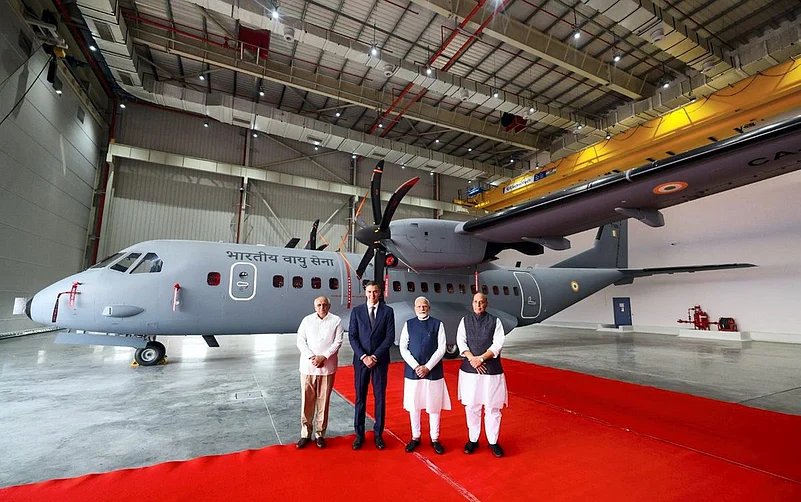The Tata-Airbus C295 aircraft manufacturing facility, recently opened in Vadodara, is a major milestone for India’s defense and aerospace industries. Prime Minister Narendra Modi and Spanish Prime Minister Pedro Sanchez inaugurated India’s first private military aircraft manufacturing facility, the Tata Aircraft Complex. This project highlights the growing partnership between India and Spain, aimed at elevating India’s defense manufacturing capabilities and reinforcing the mission, “Make in India, Make for the World.”
Operated by Tata Advanced Systems Limited (TASL) in partnership with Airbus, this advanced facility will manufacture C295 military transport aircraft to replace India’s older Avro-748 fleet. Originally developed by CASA (now part of Airbus Defence and Space), the C295 is a highly adaptable aircraft, designed for tactical airlifting, medical evacuations, and maritime patrol, among other missions. The establishment of this facility demonstrates the country’s commitment to advancing its aerospace technology landscape.
India’s First Private Military Aircraft Manufacturing Facility
The new Vadodara facility marks a milestone as India’s first private sector final assembly line for military aircraft. In September 2021, India signed a deal with Airbus Defence and Space worth nearly Rs 21,000 crore for 56 C295 aircraft for the Indian Air Force. Under this agreement, Airbus will deliver the first 16 planes from Spain, while the remaining 40 will be built locally by TASL. Prime Minister Modi laid the foundation stone for the facility just a year ago in October 2022, and it has since been fast-tracked to boost India’s aerospace self-reliance.
Reflecting on the facility’s potential, Modi noted that projects of this scale embody the "New India" vision, where the speed of execution from idea to implementation is evident. This swift approach and Tata-Airbus’s ambition highlight India’s evolving project management culture and are expected to generate thousands of new jobs. With 18,000 components being manufactured locally, the facility will provide substantial opportunities for India’s micro, small, and medium enterprises (MSMEs), supporting the entire defense supply chain.
Strengthening India-Spain Relations
The collaboration between India and Spain is the result of shared interests and the need for bolstered defense capabilities in both countries. Spanish Prime Minister Pedro Sanchez shared his optimism for the project, citing it as a testament to the deepening India-Spain relationship. Sanchez emphasized that the factory’s first aircraft will roll out in 2026, further cementing the India-Spain partnership in high-technology manufacturing. Modi also acknowledged the cultural and intellectual contributions of Spanish individuals like Father Carlos Valles, a Jesuit priest who made an enduring impact on Indian culture, showcasing the longstanding and diverse ties between the two nations.
Economic and Strategic Impact of the Tata-Airbus Facility
The C295 manufacturing facility serves multiple strategic purposes. Modi stressed the role of this facility in skilling India’s workforce, generating job opportunities, and increasing India’s industrial footprint in the global defense market. Projects like this reflect a clear shift in India’s defense policy, where the focus has moved from import dependency to indigenous manufacturing. Just a decade ago, India’s defense manufacturing capabilities were modest, largely relying on imports. Today, thanks to a focused policy shift and initiatives like the Defense Production and Export Promotion Policy (DPEPP) 2020, India’s defense ecosystem is expanding rapidly.
The manufacturing facility aims to not only meet India’s military needs but also establish a foundation for civil aviation production. Modi indicated that the expertise gained through this facility could eventually support the production of Made-in-India civil aircraft. With over 1,200 new aircraft orders from Indian airlines, there is immense potential to create a self-sufficient aviation industry that caters to both domestic and international demands. Modi expressed confidence that the Vadodara plant’s role will extend from military to civil aviation manufacturing, setting a new trajectory for the industry in India.
Boosting MSMEs and Indigenous Capabilities
The C295 project promises significant growth for MSMEs, which are integral to the defense and aerospace supply chain. The manufacturing of critical aircraft parts in India will allow MSMEs to enhance their technological capabilities, increase their scale of operations, and integrate into a high-value industry. Alongside giants like Bharat Electronics and Bharat Dynamics, smaller firms will contribute to manufacturing and maintenance operations, ultimately increasing self-reliance in critical defense technologies.
Additionally, the C295 aircraft program will strengthen India’s position as a global defense manufacturing hub. By producing high-quality military aircraft locally, India can meet its defense needs more economically and with faster response times than relying on foreign suppliers. This facility is poised to export aircraft in the future, placing India on the map as an exporter of military-grade equipment. The establishment of this private assembly line also makes India a potential service provider for Maintenance, Repair, and Overhaul (MRO) services, offering support throughout the aircraft's lifecycle.
A Step Towards Aviation Hub Aspirations
The Indian Prime Minister highlighted India’s booming aviation sector, noting its impressive growth over the past decade and the government’s proactive initiatives to enhance air connectivity in small cities. He emphasized that the C295 facility aligns with India’s vision of becoming a leading player in aviation manufacturing and MRO services. By establishing facilities like this, India is not only creating an ecosystem that can support future Made-in-India aircraft production for civilian purposes but also boosting local job opportunities. Modi underscored that the facility’s operations will enable India to take significant strides toward these aspirations, solidifying its role as a prominent aviation hub in Asia.
The Tata-Airbus C295 manufacturing facility stands as an achievement of phenomenal nature in India’s journey toward defense and aerospace self-reliance. The combination of world class technology, strategic global partnerships, and indigenous capabilities, this project stands as an example of India’s evolving role in high-tech manufacturing. The facility not only supports India’s defense readiness but also strengthens India-Spain relations, showcases a successful public-private partnership, and offers a solid foundation for future aviation and defense goals. As India advances its 'Make in India, Make for the World' initiative, the Tata-Airbus collaboration in Vadodara represents a pivotal move towards positioning the country as a global leader in defense manufacturing and aviation.



























